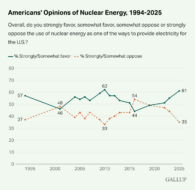Texas wants to be the nation’s go-to destination for companies looking to build new nuclear capacity. It’s been weighing the pros and cons of a state fund to support new nuclear development, and it looks like the pros are winning out.
On Wednesday, the Texas House of Reps passed House Bill 14, which would create a state nuclear office responsible for supporting nuclear supply chain development as well as new construction projects.
- The bill would also allocate $200M for eligible nuclear builds.
The bigger picture: Texas will need more energy—like, a lot more—to meet its expansion goals for data and industrials. Texas grid operator ERCOT expects 43 GW of load growth by 2029.
The $200M indicated in House Bill 14 is only part of the potential funding for new nuclear. In March, bill author Rep. Cody Harris said he planned to seek $2B for a nuclear fund. Meanwhile, a state appropriations bill under consideration in the House would set aside $750M.
All aboard: The Texas friendliness toward new nuclear has been successful in attracting nuclear projects—and it helps that there’s a wide range of potential customers, from data centers and oil drilling operations to industrials, already making a home in the Lone Star State.
- Natura Resources is building a reactor at Abilene Christian University.
- Oklo ($OKLO) signed a deal with Texas-based oil and shale producer Diamondback Energy last year to provide 50 MW of nuclear for Permian Basin operations.
- Last Energy is developing a 600-MW, 30-reactor plant in Texas to fulfill data center demand—a new branch of its strategy, which previously focused on European deployment.
- X-energy is working with chemicals giant Dow to transition one of its Texas plants to nuclear energy.
- Texas A&M has also invited a handful of nuclear firms—Natura, Aalo Atomics, Kairos Power, and Terrestrial Energy—to build reactors on one of its campuses.
“Meeting this moment will require consistent, dependable power, and with our business-friendly climate, streamlined regulatory processes, and energy-savvy workforce, we are well-positioned to become the hub for next-generation nuclear development,” Texas Nuclear Alliance President Reed Clay said in response to the bill’s passage.
Next steps: The bill is now on its way to the Texas Senate with six weeks left in the current legislative session. The Senate must decide whether to approve the funding and how much to allocate to the nuclear fund.
Lead Reporter of Ignition





